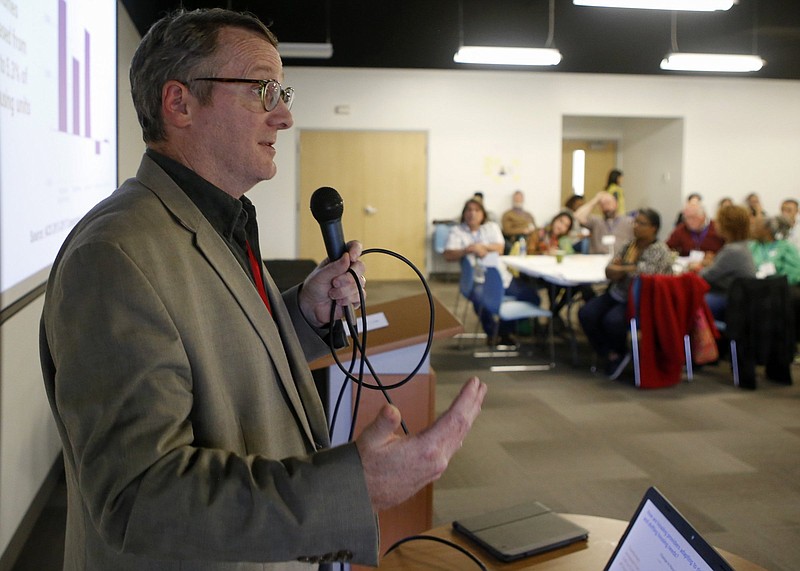Bridger steps down as head of planning
After 20 years of service, John Bridger is stepping down as executive director of the Chattanooga-Hamilton County Regional Planning Agency in May.
Bridger first joined the Regional Planning Agency in 1991 where he assisted in developing the city's first landscape ordinance under the then Chattanooga Mayor Jon Kinsey. He later was promoted to manager of the Design Center, and eventually took over the comprehensive planning work when the agency developed the Hamilton Place and Hixson-North River Area Plans; he also assisted then-Mayor Bob Corker to develop neighborhood plans as part of the Strategic Neighborhood Initiative. After working with the agency for 10 years, Bridger worked with the Community Impact of Chattanooga, which was charged with revitalizing eight urban neighborhoods surrounding the downtown for a decade, before becoming executive director of the Regional Planning Agency in 2010.
"John has been an integral part in helping our community grow into the city we are today and his dedication to the city will be missed," Chattanooga Mayor Andy Berke said in a statement Wednesday.
Hamilton County Mayor Jim Coppinger said Bridger helped allow for new and better development "by creating a pattern of smart growth that has enriched this county."
The Executive Committee of the Regional Planning Agency, which includes the mayor of Chattanooga, the county mayor, the Planning Commission Chair, and the chairs of the County Commission and City Council will be responsible for filling the Executive Director position.
Federal deficit jumps to $1 trillion in 5 months
The U.S. government's budget deficit through February hit an all-time high of $l.05 trillion for the first five months of a budget year, as spending to deal with the coronavirus pandemic surged at a pace far above an increase in tax revenue.
The Treasury Department reported Wednesday that the October through February deficit was 68% larger than the $624.5 billion deficit recorded during the same period last year.
It easily surpassed the previous five-month deficit of $652 billion set in 2010 when the government was spending to try to lift the country out of the deep recession caused by the 2008 financial crisis.
The Congressional Budget Office has projected that the deficit for the budget year that ends on Sept. 30 will be $2.3 trillion. However, that estimate does not include the cost of President Joe Biden's $1.9 trillion COVID relief measure, which has cleared the Senate and is up for approval in the House. Last year's deficit, also driven higher by virus relief packages, was a record $3.1 trillion.
The deficit for the month of February was $310.9 billion, up from $236.3 billion in February 2020, the month before the pandemic hit with force, shutting down businesses and triggering millions of job losses.
From October through February, government revenue is up 5.1% to $1.44 trillion while outlays are up 24.7% to $2.48 trillion. The deficit is the gap between revenues and outlays.
Pillsbury to offer ready to eat treats
For the first time in its more than 150-year history, Pillsbury will have ready-to-eat treats in the cookie aisle, reflecting a nation that's over its pandemic baking craze.
Nearly a year after laborious baking projects, like sourdough bread, took over America as a form of distraction during new pandemic lockdowns, the pendulum is swinging the other way. Research shows consumers are weary from cooking and cleaning up three meals a day and are craving shortcuts and convenience.
Pillsbury, owned by General Mills, is best known for its premade refrigerated doughs, but even that requires dirtying a baking sheet.
The company isn't reinventing the wheel with its shelf-stable soft baked cookies. Instead, it's directing Pillsbury's baking prowess toward a product for consumers who want a sweet treat now - not in 10-14 minutes.
"We focused on launching Pillsbury Soft Baked Cookies for that quick treat, knowing there is not always time for baking," Jeff Caswell, president of General Mills' snacks division, said in a statement.
Higher gas prices push up CPI by 0.4%
U.S. consumer prices increased 0.4% in February, the biggest gain in six months, led by a sharp jump in gasoline prices. But core inflation, excluding food and energy, posted a much smaller 0.1% gain, easing fears about a possible sustained acceleration in inflation.
The Labor Department said Wednesday that the February advance in its consumer price index followed a 0.3% rise in January and was the largest advance since a similar 0.4% increase in August.
Consumer prices are up 1.7% over the past year, a still moderate performance for inflation which is running below the Federal Reserve's 2% target for price increases. Core inflation, which excludes volatile food and energy, is up just 1.3% for the past 12 months.
Still, financial markets have been roiled in recent weeks about worries that inflation could suddenly start climbing at a faster rate, prompting the Federal Reserve to start raising its benchmark rate which has been a a record low since the pandemic hit a year ago.
Over half of the 0.4% overall price increase in February came from a second monthly surge in gasoline prices, which rose 6.4% after a 7.4% jump in January. Gasoline costs have been climbing since December, reflecting rising costs of crude oil.
- Compiled by Dave Flessner
